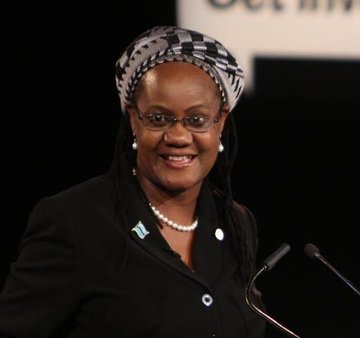
3. I am particularly encouraged by the broad scope of the subjects to be covered, in terms of the types of crime, as well as the transnational aspects of the inquiry, which will require a multidisciplinary approach. As the panellists tackle these topical themes, let us all contribute towards the discourse to develop a regional and international response to these complex criminal activities.
4. We in Botswana are keen to utilise this opportunity to learn from the practitioners who are engaged in investigations and prosecutions of international and transnational organised crimes. The transnational impact of these crimes complicates efforts to counter them nationally and we look to the experts to assist us to understand how to combat them, and how to effectively link our interventions with other countries for better results.
5. I believe that it is also essential for states to develop practices of effective international cooperation among legal enforcement agencies to curb the spread of the crimes. This would involve processes of continuous cooperation to ensure that the affected states have a coordinated response.
6. Key to this discourse is the role of national mechanisms and their response to the nature of the crimes. The regulation of crimes within states has a direct relationship with the outcome of internal investigations and prosecutions. The synchronization of domestic and international legislation is indispensable in ensuring the administration of justice at this level.
7. We further need to mobilise adequate financial resources at the national, regional and international level to ensure an effective response as and when the need arises. We need legislation, robust institutions which adhere to the rule of law, and well trained experts within our respective jurisdictions to combat these crimes and foster regional and international cooperation.
8. Meetings of this specialized nature are important in generating dialogue to deepen our knowledge and interventions for investigating, prosecuting and most importantly, stopping these criminal networks before they begin and spread.
9. Transnational organised crime is one of the ten threats and challenges to international peace and security identified by the United Nations' High-level Panel on Threats, Challenges and Change. The UN has taken a stand against this threat with the United Nations Convention against Transnational Organised Crime (Palermo Convention), which has been adopted to fight against transnational organised crime.
10. We are dealing with a dynamic situation where criminals and their networks are constantly running ahead of the system. Domestic legal systems must be able to respond to the new types of organised crimes and they must focus on their diverse and inter-connected nature.
11. Speaking from the Botswana perspective, I am pleased that in addition to analysing the core international crimes and transactional crimes, there will be a special focus on the increasing incidences of wildlife crimes.
12. As the concept note indicates, wildlife crimes are becoming more complex and are beginning to intersect with crimes of interest to international criminal law due to smuggling networks, funding for armed groups, etc. For example, the ivory trade and poaching has helped to fund armed groups in the Congo as well as Joseph Kony’s Lord’s Resistance Army. Both of these non-state groups have leaders indicted by the International Criminal Court.
13. I wish to highlight wildlife crimes which are part of the more complex dynamic. These are aggravated by the demand of trophies internationally. These continue to dominate especially in developing countries such as Botswana. This is why we have taken stringent measures to deal with this scourge, by certifying surveillance and increasing penalties for wildlife crimes.
14. We must not forget that strengthening of the rule of law and meticulous action against corruption will go a long way in ensuring that transnational crimes are tackled efficiently.
15. We should utilise this platform to explore and share experiences looking at the backdrop that the crimes have developed and are no longer exclusive but are symbiotic in nature. For example the proceeds derived from illicit arms trade, illegal wildlife and mineral smuggling trade, can be used to fund crimes against humanity.
16. As we deliberate let us seek to establish linkages between organised crime and core international crimes with a view to draw conclusions for better coordinated investigations and prosecutions of crimes which deprive law-abiding citizens of their security, property and undermines world peace.
17. Paramount to this exchange are the international mechanisms on international cooperation which define investigations and prosecutions of transnational crimes and serious crimes. These address mutual legal assistance and extradition between states, and improving the use of these mechanisms enhances collaboration and implementation of the Palermo Convention.
18. Providing mutual legal assistance is difficult and complicated because a multiplicity of legal requirements must be respected, and two or more national justice systems, often with very different characteristics, must be effectively merged.
19. Therefore, prosecutorial and judicial authorities should work as much as possible in an environment of mutual trust and devote operational resources to informal, direct requests for assistance in anticipation and preparation of the formal procedures of mutual assistance.
20. Specialised central authorities, international networks of prosecutorial and judicial authorities and meetings with foreign officials (both general meetings and ad hoc meetings in the context of individual cases) can all play an important role in facilitating mutual legal assistance.
21. A joint investigative team can be an effective tool for concerting law enforcement and prosecutorial actions against organised crimes offences involving two or more countries.
22. However, the problematic combination of powers stemming from two or more separate justice systems and the numerous legal issues that can arise from a joint team’s operations suggest that the team’s establishment should not be simply be a response to immediate needs of a concrete case, but should be inspired by, and framed in, a set of substantive general norms and highly detailed regulations agreed upon bilaterally or regionally.
23. Ladies and gentlemen confiscation of the proceeds and instrumentalities of crime is not a punishment of secondary importance; instead, it should be considered a fundamental component of the criminal justice response to organised crime. This is why in Botswana we have in the past couple of years passed legislation on the Proceeds of Serious Crimes, Anti-Money Laundering and Human Trafficking.
24. Investigators and prosecutors thus should consider financial investigation and asset preservation measures as integral and important parts of their actions in addition to establishing criminal liability. To the extent permitted by domestic law, financial investigation and preservation measures should be integrated from the outset in the planned action of law enforcement and prosecutorial authorities.
25. This symposium provides an opportunity to share our experiences at national, regional and international level. I am confident that our deliberations will be rich, our outcomes fruitful and most importantly, action oriented




